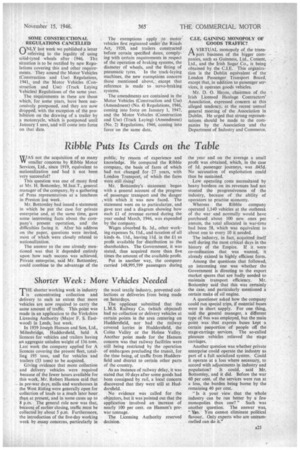Shorter Week: More Vehicles Needed T HE shorter working week in
Page 25

If you've noticed an error in this article please click here to report it so we can fix it.
industry is concentrating collection and delivery to such an extent that more vehicles are now required to carry the same amount of traffic. This point was made in an application to the Yorkshire Licensing Authority (Major F. S. Eastwood) in Leeds, last week.
In 1939 Joseph Hanson and Son, Ltd., Milnsbridge, Huddersfield, held A licences for vehicles and trailers having an aggregate unladen weight of 136 tons. Last week the company applied for A licences covering the present fleet, totalling 195 tons, and for vehicles and trailers (33 tons) to be acquired.
Giving evidence that more collection and delivery vehicles were required because of the fewer hours available for this work, Mr. Robert Hanson said that in pre-war days, mills and warehouses in the West Riding were generally open for collection of loads to a much later hour than at present, and in some cases up to 8 p.m. The general rule now was that, because of earlier closing, traffic must be collected by about 5 p.m. Furthermore, the introduction of the five-day working week by enany concerns, particularly in the wool textile industry, prevented collections or deliveries from being made on Saturdays.
The applicant submitted that the L.M.S. Railway Co. (which objected) had no collection or delivery vehicles at certain points in the area centering on Huddersfield, nor had the railway covered lorries in Huddersfield, the Caine Valley or the Rohm Valley. Another point made for the Hanson concern was that railway facilities were still being restricted by the operation of embargoes precluding the transit, for the time being, of traffic from Huddersfield and district to certain other parts of the country.
As an instance of railway delay, it was stated that 10 days after some goods had been consigned by rail, a local concern discovered that they were still at Huddersfield.
No evidence was called for the objectors, but it was 'pointed out that the application involved an increase of nearly 100 per cent. on Hanson's prewar tonnage.
The Licensing Authority reserved decision.




































































